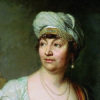Madame de Stael

Madame de Stael
Anne Louise Germaine de Staël-Holstein, commonly known as Madame de Staël, was a French woman of letters of Swiss origin whose lifetime overlapped with the events of the French Revolution and the Napoleonic era. She was one of Napoleon's principal opponents. Celebrated for her conversational eloquence, she participated actively in the political and intellectual life of her times. Her works, both critical and fictional, made their mark on the history of European Romanticism...
NationalityFrench
ProfessionWriter
Date of Birth22 April 1766
CountryFrance
The sight of such a monument is like continual and stationary music which one hears for one's good as one approaches it. [Fr., La vue d'un tel monument est comme une musique continuelle et fixee qui vous attend pour vous faire du bien quand vous vous en approchez.]
If it were not for respect for human opinions, I would not open my window to see the Bay of Naples for the first time, whilst I would go five hundred leagues to talk with a man of genius whom I had not seen.
The education of life perfects the thinking mind, but depraves the frivolous.
Only the refined and delicate pleasures that spring from research and education can build up barriers between different ranks.
The egotism of woman is always for two.
Superstition is related to this life, religion to the next; superstition is allied to fatality, religion to virtue; it is by the vivacity of earthly desires that we become superstitious; it is, on the contrary, by the sacrifice of these desires that we become religious.
When women oppose themselves to the projects and ambition of men, they excite their lively resentment; if in their youth they meddle with political intrigues, their modesty must suffer.
The soul is a fire that darts its rays through all the senses; it is in this fire that existence consists; all the observations and all the efforts of philosophers ought to turn towards this Me, the centre and moving power of our sentiments and our ideas.
To pray together, in whatever tongue or ritual, is the most tender brotherhood of hope and sympathy that man can contract in this life.
O Earth! all bathed with blood and years, yet never / Hast thou ceased putting forth thy fruit and flowers.
When we destroy an old prejudice, we have need of a new virtue.
The face of a woman, whatever be the force or extent of her mind, whatever be the importance of the object she pursues, is always an obstacle or a reason in the story of her life.
Music revives the recollections it would appease.
I believe that happiness consists in having a destiny in keeping with our abilities. Our desires are things of the moment, often harmful even to ourselves; but our abilities are permanent, and their demands never cease.